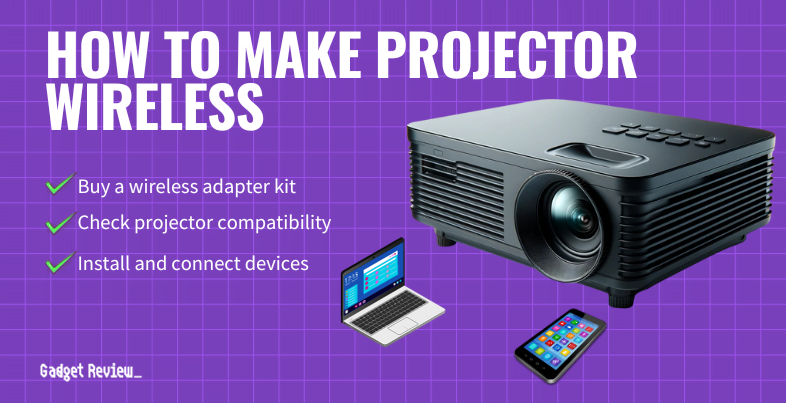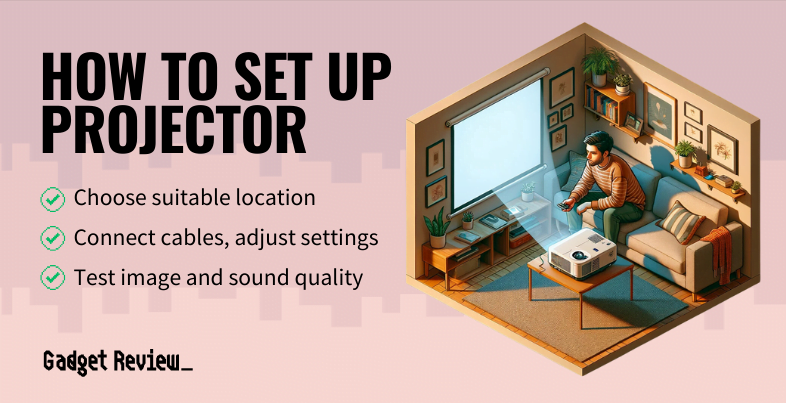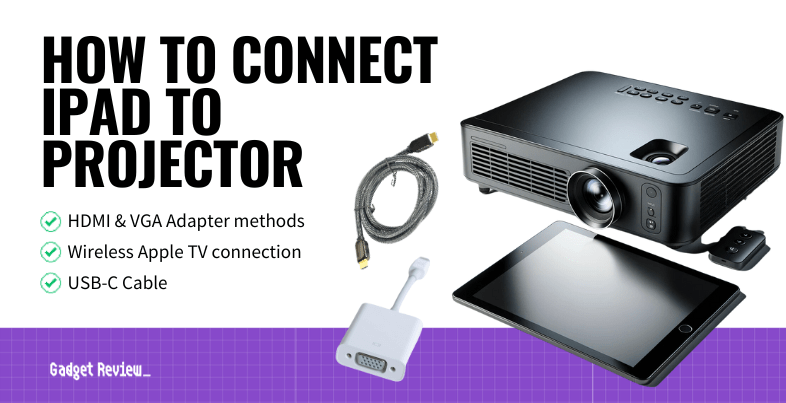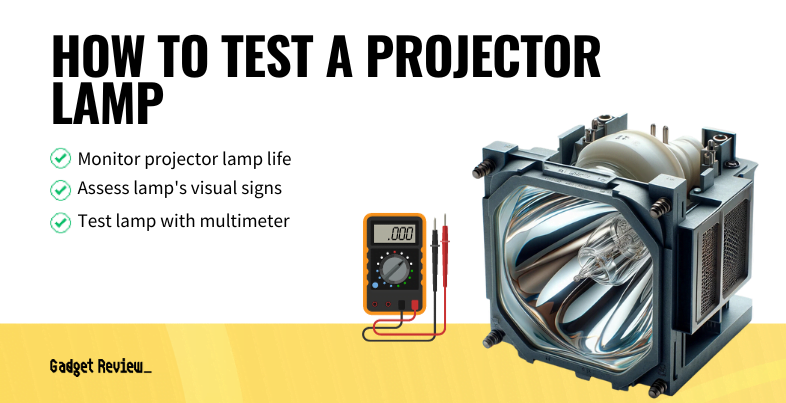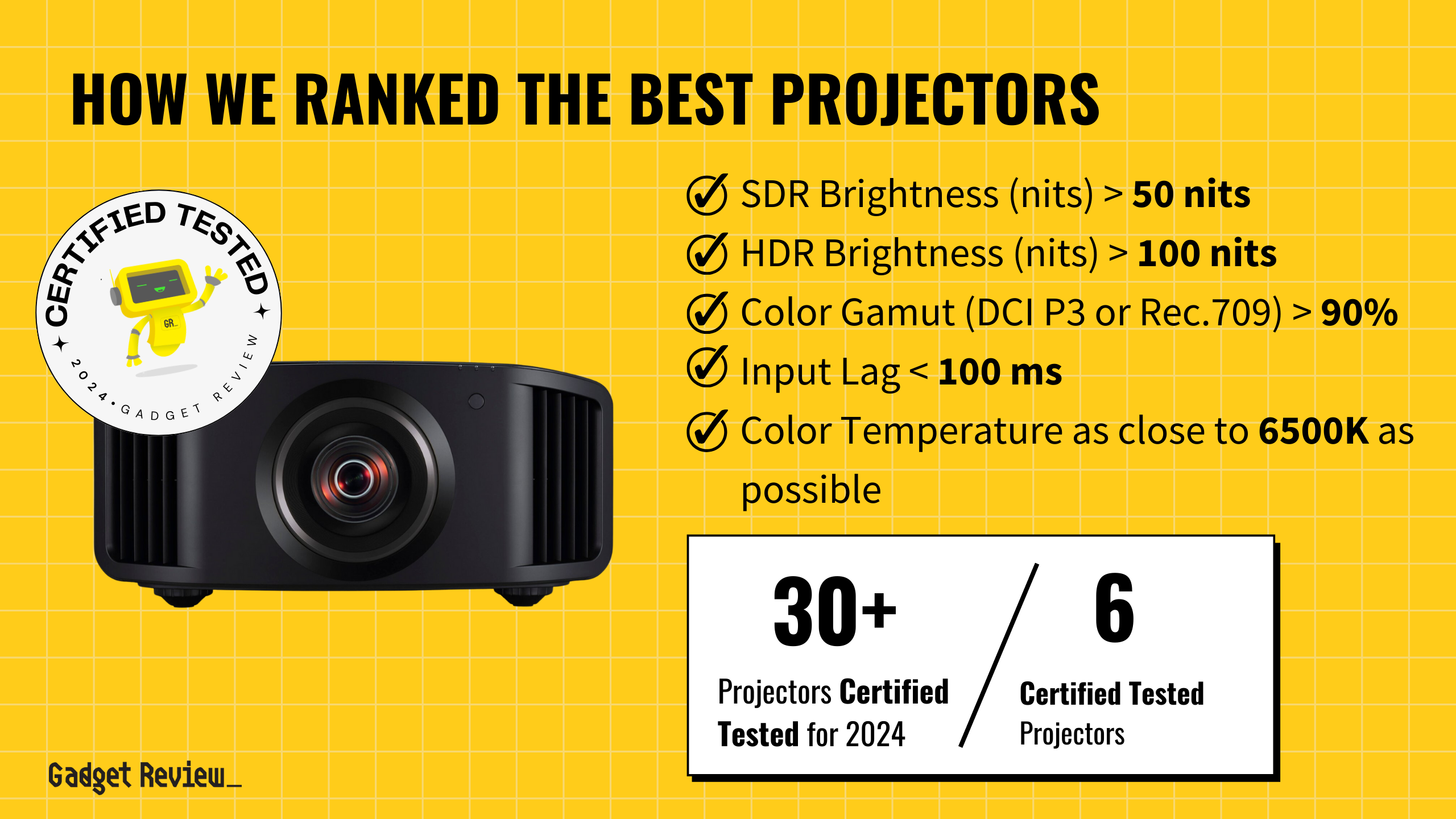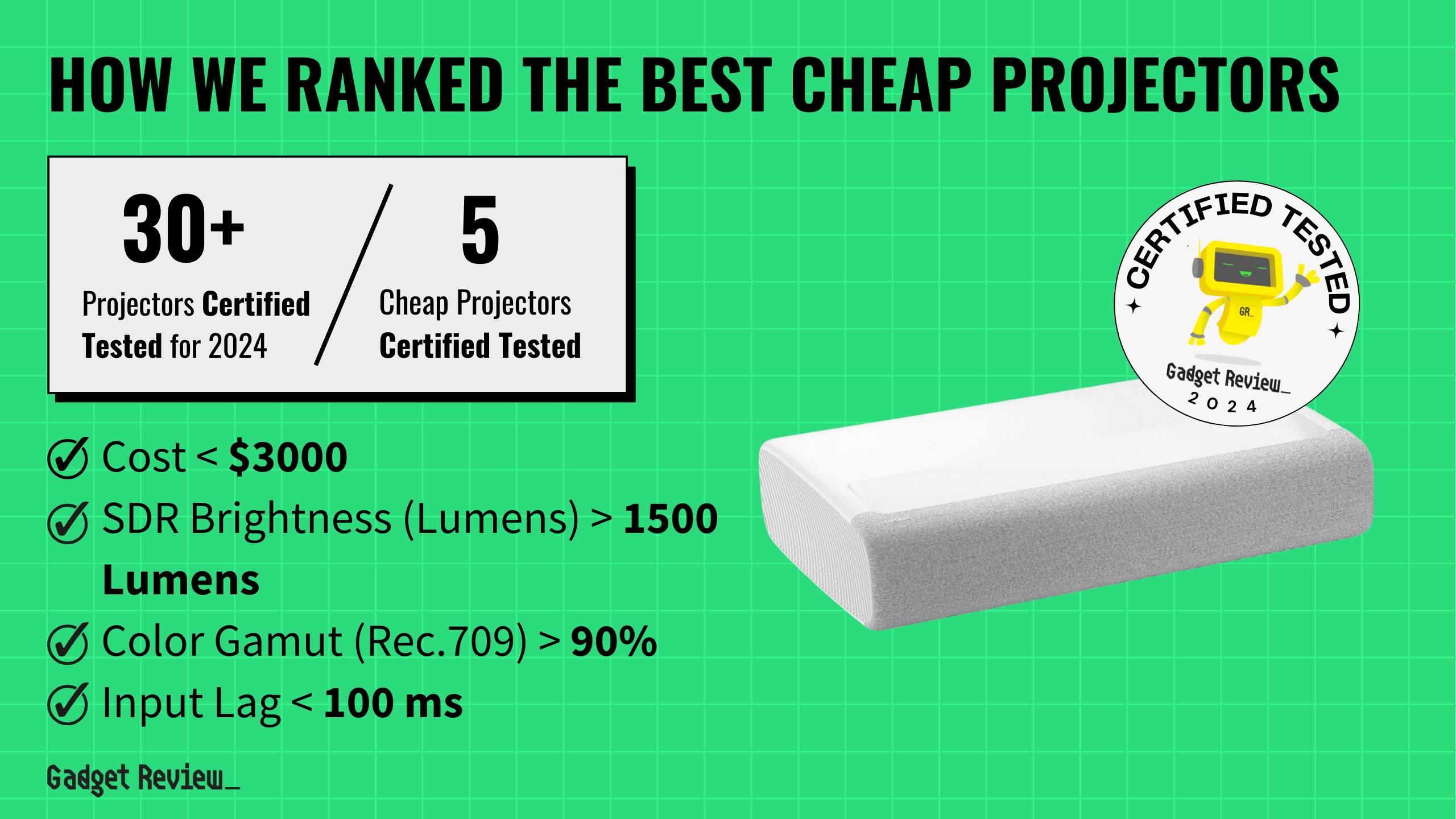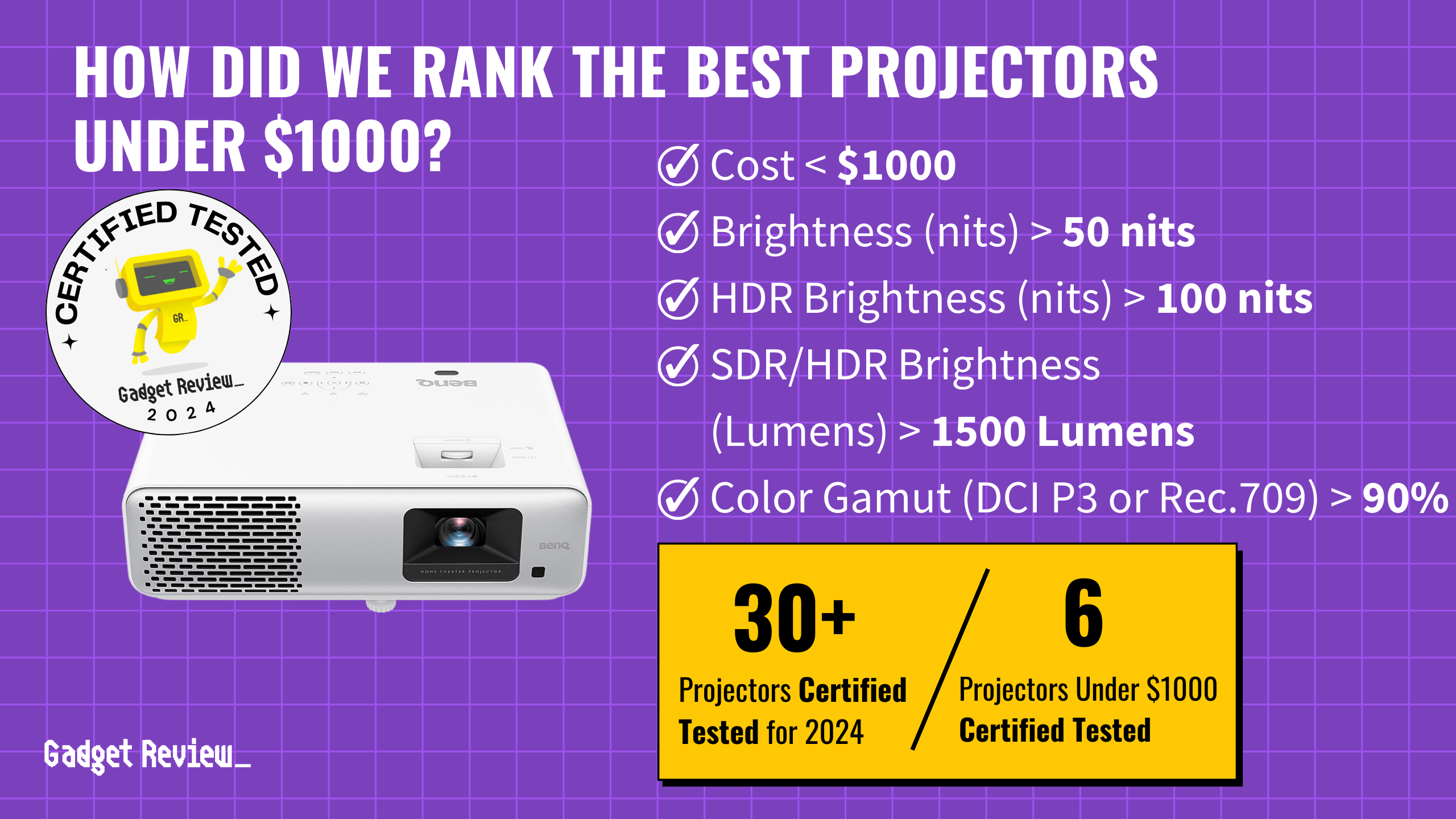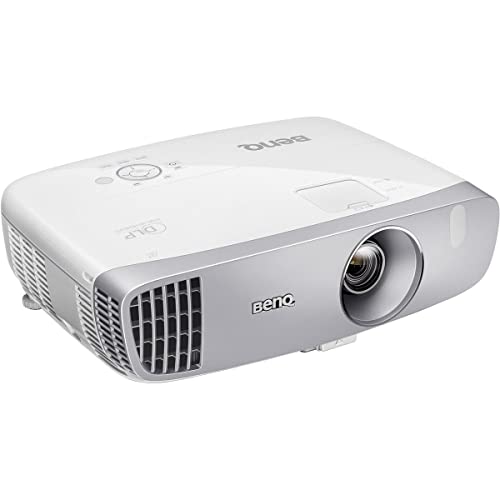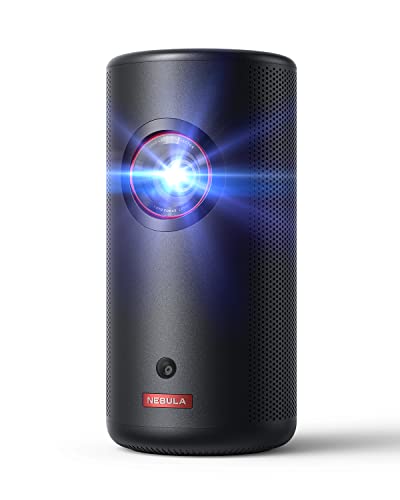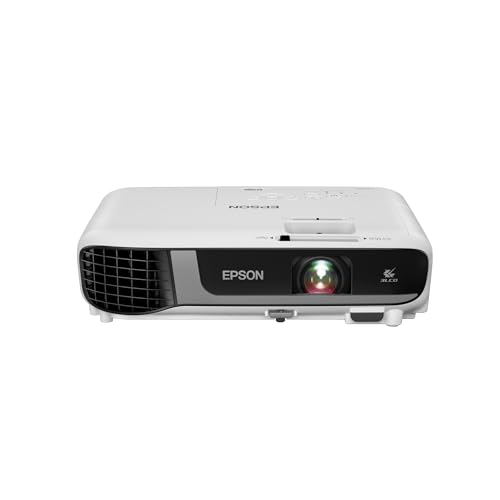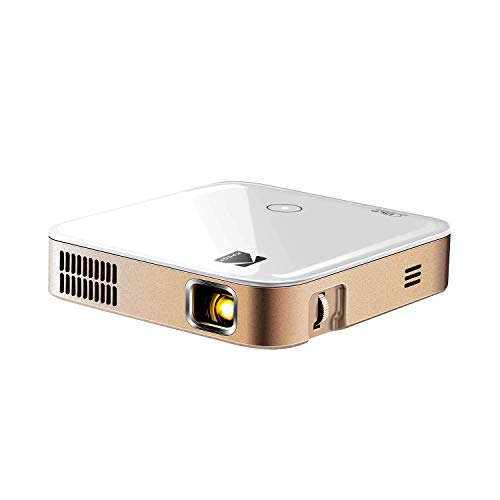What are the features that make the best Sony Projectors? As with all the best home theater projectors and full-featured cinema projectors, it depends on the space and the ambient light levels. Sony projectors have outstanding optical quality. Their laser projectors deliver a sharp picture with uniform image quality and plenty of contrast.
Sony’s 4k and HD models have an excellent reputation in the projector market for high-tech features such as laser light sources and sophisticated motion resolution. Thus, experts suggest looking for a Sony projector with excellent motion processing and great dynamic range. The brand also offers multiple connectivity options, so you’ll easily connect to your media sources and speaker system.
Keep reading to learn more about the best Sony projectors and how they compare to the top-rated models from other leading projector manufacturers, such as Samsung’s projectors.
Top Sony Projectors
#1 Sony VW325ES Projector
Award: TOP PICK
WHY WE LIKE IT: This device produces UHD pictures and has a high dynamic range enhancing system that offers great contrast ratios and colorful imagery. It upscales low-resolution content, producing vibrant graphics.
- Gorgeous high dynamic range pictures
- 4K resolution
- Motionflow tech for smooth playback
- Low native brightness
- High minimum throw distance
The Sony VPL-VW325ES projector runs on a high-quality X1 processor that offers smooth performance that’s similar to the leading InFocus projectors. This projector features a Dynamic Range enhancer, offering impressive contrast for realistic imagery. With Advanced Reality Creation, this projector upscales and sharpens images, reducing noise from low-resolution inputs and it has an expected lamp cycle of about 6,000 hours. The display has a low input lag that will delight gaming enthusiasts. However, this projector has a relatively low 1,500-lumen native maximum brightness.
This model comes with a full-service remote control for hassle-free operation. It has a stylish curved design that offers a sleek appearance and features a minimum throw distance of about 8 feet, so it’s ideal for large home theaters and conference rooms. Motionflow technology offers fluidity, eliminating screen tearing. This projector has an SXRD panel optimized for high contrast. This model has a powered zoom lens and wide lens shift range for a hassle-free setup.
#2 Sony VPL-VW715ES Projector
Award: HONORABLE MENTION
WHY WE LIKE IT: Producing UHD pictures and equipped with Advanced Reality Creation tech, this projector offers vivid vibrant imagery and upscales low-resolution images. It has two HDCP 2.2-compatible HDMI inputs.
- Impressive UHD resolution
- Supports HDR content
- Advanced Reality Creation upscales HD and Full HD content
- So-so lamp life
Featuring a dynamic HDR enhancer, this Sony VPL-VW715ES projector delivers striking content with an incredible contrast ratio of up to 350,000:1. The projector runs on Sony’s X1 Ultimate image processor, delivering very rich colors smoothly. With a native 4K resolution, this Sony projector offers impressive details, making it a good choice for events, home theaters, classrooms, and large conference rooms. However, with an expected lamp cycle of about 6,000 hours, this projector is maintenance-intensive.
It has an optimized design with ventilation grilles to prevent overheating. An advanced SXRD panel offers deep black scenes that will appeal to movie buffs and gaming enthusiasts. This projector has a maximum brightness of 1800 lumens, so it’s suitable for various indoor settings. With Advanced Reality Creation technology, the device upscales lower resolution content, preventing pixelation and providing sharp noise-free pictures and it supports HDCP 2.2 on both HDMI inputs for safe screen sharing.
#3 Sony VPLEW455 Projector
Award: BEST BUDGET
WHY WE LIKE IT: A suite of ports that include an interface for an optional wireless dongle offers flexible connectivity options. This model is relatively affordable and has an expected lamp life of about 10,000 hours.
- Excellent lamp life
- Works with an optional wireless dongle
- Impressive 3500-lumen maximum brightness
- Low WXGA 1280 x 800 resolution
This Sony VPLEW455 projector has intuitive controls that offer effortless operation. An adjustable lens with up to 1.6x zoom on this unit simplifies the setup. This projector produces remarkably bright pictures with a maximum brightness of 3500 lumens. A 16W mono speaker on this device offers high-fidelity audio, eliminating the need for connecting the projector to external sound output devices. However, its WXGA 1280 x 800 resolution is on the low side.
It has an expected lamp life of about 10,000 hours, offering simple maintenance. This projector has a black and white color scheme that provides visual appeal and it has a rich collection of digital and analog ports that provide compatibility with a wide variety of devices. Users can connect DVD players and older computers via the composite video, S-video, and VGA ports, while the dual HDMI and USB ports plugin seamlessly to modern computers. This monitor also has an IFU-WLM3 interface that works with an optional dongle for wireless connectivity.
#4 Sony VPL-VW915ES Projector
Award: BEST FOCUSING TECH
WHY WE LIKE IT: A Digital Focus Optimizer and physical iris on this device facilitate fast and accurate focusing. This projector has high dynamic range technology, offering outstanding contrast.
- Advanced focusing tech
- Supports HDR content
- 4K resolution
- So-so image brightness
Powered by the X1 Ultimate image processing engine, the VPL-VW915ES projector delivers incredible imagery. The projector has a very efficient laser diode lamp that runs for up to 20,000 hours before requiring replacement. It boasts an advanced SXRD panel, offering an outstanding contrast ratio that will appeal to movie buffs. This projector is also equipped with a mounting interface that will come in handy for ceiling mounting. However, with a maximum brightness of just 2,000 lumens, this projector doesn’t get very bright.
This Sony projector has Digital Focus Optimizer technology for fast and accurate focusing. A dual contrast control engine with Dynamic Laser Control enhances the picture quality. The projector has a physical Advanced Iris for easy customization. Producing pictures at resolutions of up to 4K, this model is ideal for movies, gaming, and presentations. It has Motionflow technology for flawless, stutter-free visuals. A LAN port and two HDMI inputs simplify connecting to computers, while a USB interface accommodates thumb drives.
#5 Sony BrightEra VPL-CWZ10 Projector
Award: BEST FOR MOUNTING
WHY WE LIKE IT: This projector has a very efficient laser diode lamp that runs for a long time before requiring replacement. This model gets very bright and functions well in well-lit rooms and some outdoor settings.
- Remarkably bright imagery
- Ceiling mountable design
- Durable 20,000-hour laser diode lamp
- Low 1280 x 800 image resolution
Precisely optimized to be a ceiling-mounted projector, the Sony BrightEra VPL-CWZ10 is the device of choice for users that want a permanent installation in the home theater or conference room. This projector has a front projection system that produces excellent imagery. With a maximum image size of 25 feet, this model is ideal for large events and home theater setups. However, its resolution of 1280 x 800 will disappoint users seeking to watch UHD movies.
It has a high-tech laser diode lamp that runs for up to 20,000 hours before requiring replacement. The projector is remarkably bright, producing images at up to 5000 lumens. Leveling feet on this model enable placing this device on slanting surfaces. With controls for zooming and focusing, this projector offers hassle-free customization, simplifying setup. It has a selection of ports that include USB, HDMI, and VGA, and it’s well-ventilated to prevent overheating. That way your projector won’t overheat and disrupt your outdoor movie viewing, like what the best outdoor projectors can do.
#6 Sony VPLVW885ES Projector
Award: BEST FOR UHD CONTENT
WHY WE LIKE IT: The projector supports high dynamic range content, delivering imagery with impressive colors and infinite contrast. It has a native UHD resolution and easily upscales low-resolution media.
- Impressive UHD resolution
- Outstanding lamp life of up to 20,000 hours
- Lens shift controls
- Big minimum throw distance
- So-so brightness
Equipped with a laser lamp, the Sony VPLVW885ES projector offers sharp images. It has a native 4K resolution, delivering ultra high definition content with impressive details. This projector has a maximum brightness of about 2000 lumens and features vertical and horizontal lens shift controls, simplifying the setup in the home theater. An SXRD panel offers incredible contrast ratios that will appeal to movie lovers. However, its minimum throw distance of about 8 feet is not ideal for users with small rooms.
With High Dynamic Range (HDR) tech and an infinite contrast ratio, this projector offers incredible dark room performance, delivering deep black scenes accurately. It has a durable lamp that runs for up to 20,000 hrs in the normal mode. Reality Creation tech on this model upscales low-resolution media, mimicking 4K resolution. This projector features two HDMI inputs, enabling users to switch between various connected computers or video game consoles easily.
Introduction to Sony Projectors
Headquartered in Kōnan, Minato, Tokyo, Sony is one of the world’s top consumer electronics and media conglomerates. It began as an electronics shop in Tokyo in 1946 and went on to create one of Japan’s first tape recorders. The company started using the “Sony” brand on portable radios in 1955 and expanded to the American market in 1960.
Today, the Sony conglomerate operates the world’s third-largest movie studio, second-largest record label, and largest video game publisher. As a global leader in the CMOS digital imaging market, Sony manufactures about 55% of the world’s digital image sensors. Sony projectors also benefit from the company’s experience producing a large share of the world’s LCD panels and TFT displays.
Sony’s digital cinema projectors and home theater projectors incorporate cutting-edge image processing and light panel technology, along with a huge parts bin of optical components such as lenses and DLP mirrors, resulting in excellent picture quality. Using advanced iris control and a state-of-the-art imaging engine, Sony produces some of the leading mid and high-brightness projectors and less expensive projectors aimed at the home theater and gaming markets.
How Sony Projectors Compare to Other Brands
(Pro 1) Ultra High-Resolution: Sony offers some of the finest premium projector models in the home theater market in terms of native resolution and picture performance, but also offers great entry-level native 4K projector models. The outstanding picture processor and impressive brightness help generate quality pictures and detailed images, allowing more freedom in terms of image size.
(Con 1) Complex Menus: Compared to other brands’ projectors, even Sony’s affordable projector models offer a daunting array of adjustments and custom settings to ensure an accurate image on your projector screen. This means they can take longer to set up and pair devices such as the optional remote control or a Smart TV.
(Pro 2) Advanced Crystal on Silicon Panels: Available in a selection of Sony home theater projectors, the brand’s X1 crystal on silicon LCD enables precise light control and improved dynamic range compared to other LCD projector technologies.
(Con 2) Higher Price Points: While Sony offers some lower-priced lamp projector models, it has a comparably limited budget range and outdoor projectors. They specialize in professional, business, and high-end home entertainment projectors that tend to be in the mid to high price range compared to most projectors on the market.
(Pro 3) Low-Maintenance, Advanced Z-Phosphor Laser Models: Sony offers a wide range of laser projectors that offer up to 10,000-lumens brightness and 20,000-hour lamp life. Their high maximum brightness enables a higher contrast ratio and deeper blacks in dark scenes. In addition, a laser model typically runs cooler, requiring less active cooling than a lamp-based model.
(Con 3) Limited Portable Projector Selection: Compared to other projector brands’ lineups, the Sony range is limited when it comes to portable and mini projectors. Thus, if you’re looking for an outdoor projector, a budget home theater projector, or an inexpensive smart projector, you may find that other brands offer a wider selection.
(Pro 4) Sophisticated Professional Features: Sony offers a proven range of classroom and business projectors with 4000 lumens of image brightness or more, making them suitable for large conference rooms and labs with variable ambient light. The Sony line is worth a look if you need a device that can handle projection mapping, 3D content, and infographics with bright images and accurate color.
(Con 4) Some Models Still Using Mercury Lamps: While Sony moves toward wider adoption of laser light sources, they still use a high-pressure mercury lamp in some models. This type outperforms LED when it comes to color saturation and is a longer-lasting lamp than a conventional incandescent bulb. However, a mercury vapor lamp won’t provide the same life as a blue laser diode and requires special handling when disposing of the bulb.
Why You Should Buy a New Sony Projector
Several brands compete with Sony projectors and offer competitive projectors, including BenQ, Acer, and Viewsonic. Epson is another competitor of Sony’s, and they have differences in technology, image quality, and range of applications.
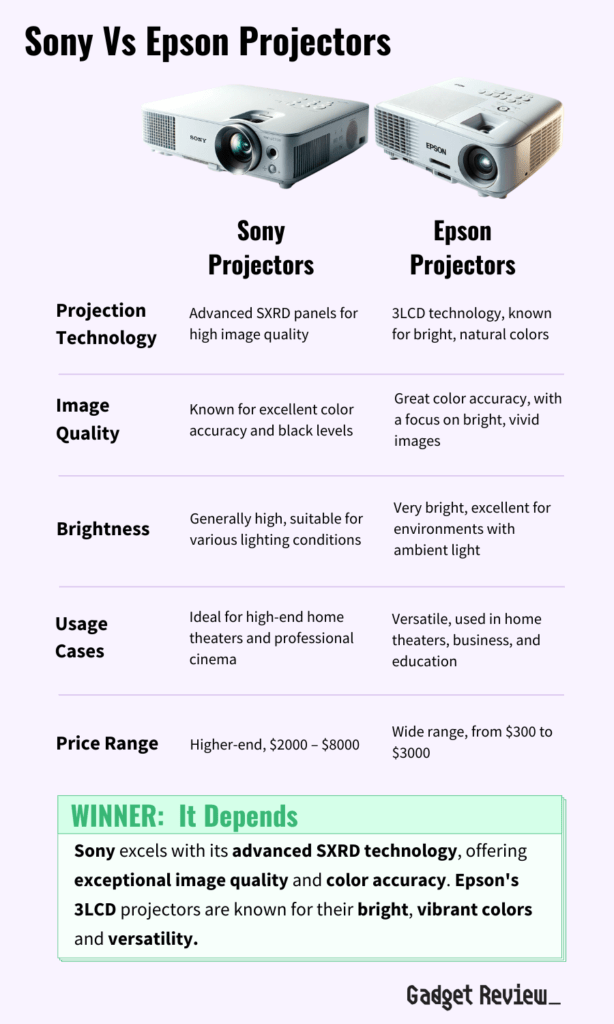
| Feature | Sony Projectors | Epson Projectors |
|---|---|---|
| Projection Technology | Advanced SXRD panels for high image quality | 3LCD technology, known for bright, natural colors |
| Image Quality | Known for excellent color accuracy and black levels | Great color accuracy, with a focus on bright, vivid images |
| Brightness | Generally high, suitable for various lighting conditions | Very bright, excellent for environments with ambient light |
| Usage Cases | Ideal for high-end home theaters and professional cinema | Versatile, used in home theaters, business, and education |
| Price Range | Higher-end, $2000 – $8000 | Wide range, from $300 to $3000 |
| Connectivity Options | Advanced HDMI, USB, sometimes wireless options | Comprehensive, including HDMI, USB, VGA, and wireless options in higher models |
| Special Features | High-resolution models, often with 4K and advanced image processing | Wide range of models with features like lens shift and high zoom ratios |
Newer Sony projectors offer leading image processing and optics display technology, providing impressive brightness and true HDR performance when viewing HDR-compatible content. Newer models also offer easier options for connecting with your laptop, smart TV, external speakers, and other input-output devices. Compared to older digital projectors, newer Sony models also have higher refresh rates and reduced input lag, nearly eliminating motion blur and choppiness for great frame rates if you are a gamer.
Sony’s newest X1 chip for home projectors supports native 4k resolution, which is still relatively rare in the home theater projector market. In addition, Sony has added more affordable laser projectors that promise a long service life and cooler, quieter operation.
If you’ve been wanting to upgrade your home theater setup to provide a more cinematic experience when showing movies, a home projector can now offer enough picture quality to satisfy cinephiles.
Alternatively, you might be looking for a new projector to make business presentations or display lecture notes, infographics, and more. In that case, Sony’s range of educational and business projectors offers some compelling choices.
How Long Will a Sony Projector Last?
Most schools and businesses assume a 3 to 5-year lifetime for a conventional lamp model installation projector. A laser model may last longer, and portable projectors may wear out sooner, depending on use and environmental conditions.
Some projector components tend to need replacement more often than others. The high-pressure mercury lamps that Sony uses on its lamp-based projectors are rated for around 2,000 hours. Air filters may need changing at similar intervals on these models. Laser and LED projector diodes may last approximately 20,000 hours.
While users may have to replace a lamp, air filter, or cooling fan more than once during a projector’s life cycle, optical modules such as DLP units and LCD chipsets typically last as long as the projector. Projector lenses may significantly outlast the projectors — some hobbyists today adapt decades-old projector lenses for cameras.
Keep your projector in an area with adequate airflow, and avoid setting it up in spaces with extreme heat or high dust levels. Overheating is one of the main factors contributing to a projector’s wear and tear. A dusty environment means the device’s air filters may need changing more often, and the lens may need more frequent cleaning.
Sony Projector Warranties
Sony USA provides a 1 to 3-year limited warranty on all new projector products. Most of their professional and home projectors get a 3-year limited warranty, excluding the projector lamps. The lamps get their own 90-day warranty. Replacement lamps purchased directly also come with a 90-day warranty.
Laser models typically come with a 3-year, 12,000-hour warranty. However, the VPL-FHZ/FWZ/PHZ/PWZ Series of laser projectors get an extended 5-year, 12,000-hour warranty. Sony’s limited warranty covers parts and labor and excludes accidental damage and wear and tear.
Most Sony projectors come with the option to purchase extended coverage as well. The extended warranty coverage terms vary, but users can generally find warranty details on Sony’s website or via their chosen retailer.










